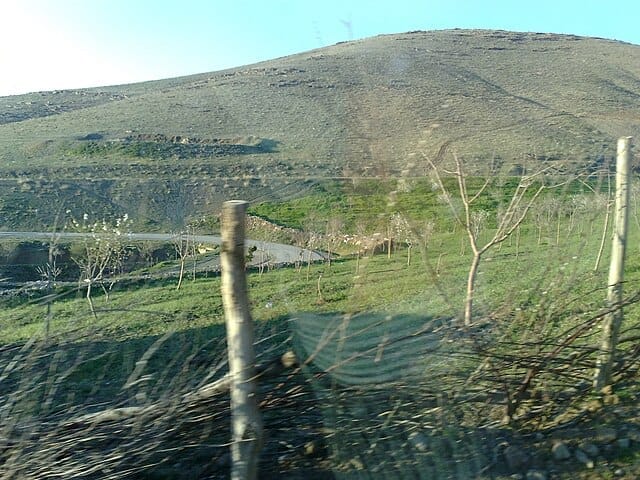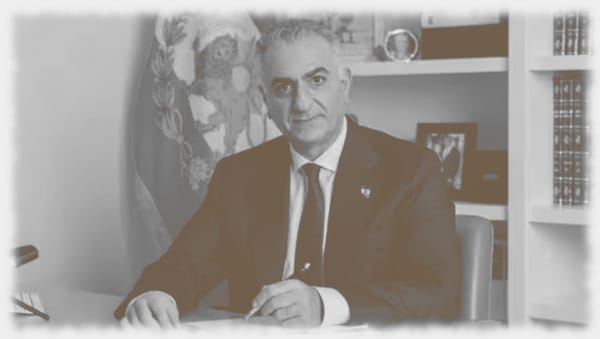From Smuggled Sheep to Border Security: Tracing the Fires in Kurdistan’s Wilderness
Between March and September, some 3,123 hectares of forests and rangelands across Kurdistan have burned. What lies behind these fires? What resources do local volunteers have to fight them? And how has the state responded?

September 17, 2025
Forests and Grasslands of Kurdistan in Flames
For nearly four months, the forests and pastures of Iran’s Kurdistan Province have been burning. The government has offered neither explanation nor serious initiative to contain the blazes. Only local residents, as in years past, have mobilized with whatever tools they can find. Since 2015, according to regional environmental activists, 17 people have died after being trapped in the fires.
No comprehensive statistics have been released for the current summer season. However, civil organizations, such as the Chya Green Society, reported that in June alone, 686 hectares of land were scorched. The blazes continue, and, in the words of local activists, the idea of extinguishing them completely is “more of a dream than a plan.”
According to Chya, between March and September, some 3,123 hectares of forests and rangelands across Kurdistan have burned. What lies behind these fires? What resources do local volunteers have to fight them? And how has the state responded?
To explore these questions, this report draws on conversations with current and former members of Chya. Both insist that human causes, often deliberate, and in many cases tied to state actors, are the dominant factor. By their accounts, officials have at times ignited blazes only to step aside, leaving villagers and volunteers to put out the flames.
Military maneuvers, cross-border sheep smuggling, and attempts to seize land are among the recurrent triggers. According to activists, many of these fires can be traced back to state and security institutions. One example is a fire near Marivan, where border guards acknowledged that a military exercise staged after Israeli strikes on Iran was responsible.
Burning Forests to Erase Smugglers’ Tracks
One of the activists, who spoke under the pseudonym Behrouz Behzadi for security reasons, is a member of Chya in Marivan. He argues that while some fires are accidental, deliberate blazes set by security forces play the most significant role:
“Most of the fires break out on the edges of towns, where land speculation and commercial interests are strongest. In border areas, guards cite security needs, such as mine clearance. During the Iran–Iraq war of the 1980s, countless mines were planted here.”
In Marivan, one of Kurdistan’s most heavily forested border towns, hundreds of hectares of woodland have been destroyed by “military maneuvers” and “live-fire drills.” After Israeli attacks on Iran, a Revolutionary Guard exercise incinerated yet more forests in the name of “security.”
Behzadi points to another, rarely acknowledged factor: border guards torching land to erase smugglers’ tracks.
“One of the main reasons border guards set fires is to wipe out smugglers’ footprints. Take sheep smuggling. Exporting meat to Iraq is banned, but a sheep worth 100 million tomans in Iran can sell for 400 million across the border. A smuggler may cut a deal with the guards to let a flock through. Or consider kulbars—men carrying a small cargo or other contraband on foot. Afterward, the guards set fire to the fields to erase the evidence.”
Neglect of the Environment, War with Kurdish Parties, and Charcoal for Cafés
When asked about climate change as a driver of the Zagros mountain fires, Behzadi assigned it only a minor role: perhaps 10 percent, compared to 90 percent for human causes.
“Blaming climate change is more of an excuse. In Marivan, more than 90 percent of the fires are man-made, whether deliberate or accidental.”
For him, the deeper root lies in official disregard:
“From the beginning, the Islamic Republic has never valued the environment. At best, it has treated it as a source of revenue. That disregard is the root cause of all these fires, human or natural.”
Among deliberate causes, Behzadi cites land seizures, smuggling routes, and military maneuvers targeting Kurdish opposition groups, among local non-state causes: drug use, charcoal production, and illegal land conversion.
Restaurants and roadside cafés in Kurdistan rely heavily on charcoal, and producing it from felled trees is highly profitable. Fires left smoldering in pits often spread into fields and forests.
Asked whether civil organizations have tried to hold security forces accountable, Behzadi was candid:
“Even when we had witnesses who saw border guards setting fires, the courts refused to hear the complaints. Weak laws, combined with fear of security agencies, among both citizens and the judiciary, allow the destruction to continue. Fines for illegal land seizures are tiny compared to the profits, so violations are simply worth it.”
Last month, activist Kamran Duplore released a video condemning the repeated, deliberate blazes. He asked officials directly:
“How can you remain indifferent to these fires? If you are not the ones responsible, why has no one ever been punished for illegal logging, arson, or poaching?”
A citizen of Kurdistan protesting the continued fires and the indifference of the authorities.
Fighting Fire with Bare Hands
In 2010, a Chya member reported that in just five months, 569 separate fires had broken out in the forests of Marivan and Sarvabad, an average of four per day.
Given the thousands of hectares now lost each year, the most astonishing fact may be the negligible number of state firefighters. Social media is filled with images of volunteers beating flames with tree branches, a stark reminder of their lack of equipment.
Behzadi explains:
“Every year, the government’s Natural Resources Office tenders out the entire firefighting contract to a group of fewer than ten people. They must provide their own tools, clothing, and even shoes. Often, they don’t even have protective gear.”
Beyond this handful of contractors, ordinary citizens do the work, driven by fear of spreading flames and by love for their land. But they are untrained and ill-equipped.
The risks are deadly. Recently, a 17-year-old visiting relatives in Hanjiran tried to extinguish a blaze. Overcome by smoke, he died after days in the hospital.
Protective clothing, fire blowers, and basic training could save lives, but even these, Behzadi argues, are not the primary need. At its core, the crisis requires political will.
Despite its vast forests, Kurdistan Province until recently had just one firefighting helicopter. After a decade of unpaid volunteer work, activists warn:
“Our efforts have misled the government into thinking it bears no responsibility. If the state truly acted, by preventing fires, by explaining their causes, by fighting them, then ordinary people would not have to risk their lives.”
Citizens Shoulder the Burden as the State Retreats
For more than a decade, the courage of volunteers has created a dangerous illusion: that ordinary people can replace the state in fighting the fires.
Behzadi warns:
“By taking on the burden ourselves, we have let the government abdicate. Love of country has silenced public demands for accountability. But this cannot go on. Each year we lose more volunteers, seventeen since 2015, including some across the border in Halabja, Iraq. Most died not because of the fires themselves, but because they lacked equipment and training.”
The blazes themselves, he adds, have become ritualized: an annual calamity in which “heroic sacrifice” substitutes for systemic prevention.
Enough Heroics: Prevention, Not Martyrdom
Aram Fathi, a poet and longtime Chya member now living in France, argues that protest, not firefighting, must become the priority.
“After more than a decade of sacrifice, we cannot simply keep sending people into the flames. Preventing fires must be our demand. Instead, the mythologizing of those who died has held back our protests.”
He points to activists such as Sharif Bajur and Omid Hosseinzadeh, who perished in 2018 while battling blazes on Mount Piran and Dalani near Marivan. Their names are still revered, as is that of an elderly man who died in 2015. But this reverence, Fathi argues, has made martyrdom itself an expectation.
Sharif Bajur, though still young, was a trusted figure in Kurdistan, often mediating disputes in his community. His death, and those of others each year since, have drawn still more volunteers into the forests.
This spirit of sacrifice, Fathi acknowledges, has preserved much of Kurdistan’s wilderness in the face of state neglect. Yet it has also bred recklessness:
“Many young people now rush into the flames without training, emulating their fallen heroes. Some activists have argued that even staging a protest, risking arrest outside the intelligence office, would be less costly than losing twenty young lives in four months.”
Protests, Repression, and the Politics of Fire
Fathi stresses that prevention is not a new demand. For years, activists have campaigned against land grabs and arson, filing lawsuits that name the Revolutionary Guard as the chief culprit. None has succeeded. Complaints are dismissed, and even sympathetic officials in natural resources are soon transferred.
Civil protests have also erupted against what activists call the “mafias” of land and resource exploitation. In the mid-2010s, demonstrations challenged Guard construction projects above Lake Zaribar, a major tourist site near Sanandaj. Chya filed lawsuits; nothing came of them. Earlier, there had been open letters and street protests, again, ignored.
In 2011, three Chya board members were jailed for months. Intelligence officials insisted the detentions were unrelated, but interrogators pressed the men about their activism, even accusing them of ties to Kurdish parties. Such repression, Fathi says, has made environmental activism itself a fearful pursuit.
Both Fathi and Behzadi point to the same conclusion: protest after protest has failed to change the government’s behavior. The same land, once seized illegally, is still burning today.
Among them is Mount Abidar, overlooking Sanandaj, a place of deep cultural pride and tourist value. Years ago, the Revolutionary Guard laid claim to it. Today, it too is ablaze.
Perhaps that is why activists now insist that broader civic movements, demanding prevention, not just heroic firefighting, must become the priority for Kurdistan’s survival.
© IranDraft — Reproduction or redistribution of this article on social media is prohibited.




